|
By: Brett Gershon 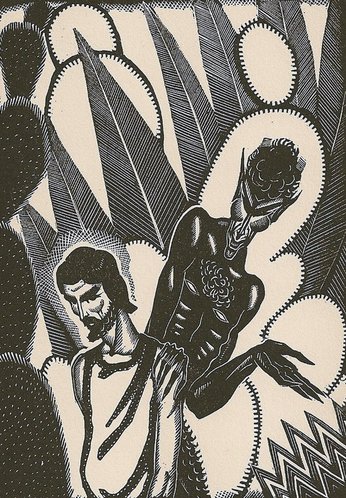 Within the last year, we have witnessed a tremendously significant political upheaval in the United States that has been galvanized by the emergence of a strong white identity-politics. A recent article published in the Huffington Post discusses how while the past several decades have been characterized by a white majority who has operated largely unaware of its whiteness, a strong sense of white identity has been slowly building as people perceive the dominant status of whiteness to be threatened. Those who now occupy seats of power have expertly manipulated the fears of the average white person to believe that their collective interests are at odds not with the upper-crust of capitalist society, but instead with racial and ethnic minorities. Simultaneously, as the white middle-class retreats more deeply into the insularity of white identity-politics, a growing Christian culture that views the Trump presidency as a means to “bring heaven to earth,” is becoming increasingly intertwined with whiteness and its compulsion to fear the racialized other. As people of color continue to fight for their very lives, it is whiteness that impels us to perceive Black struggle to be an affront to our own existence and cling to whatever political foothold we have to preserve ourselves. This is as true of the so called “Alt-Right,” supporters of the Trump presidency, and other conservative leaning White folks as it is of the White liberal who proud of their “open-mindedness” and "commitment to diversity" is quite comfortable in their existence at the center of our social world and when challenged as such will often dive into histrionic fits of White fragility to shield themselves. But what does the Gospel of Jesus Christ have to say to us as we are tempted to strengthen our borders and embolden the social and political lines that have been drawn around us? To answer this question, I pause amidst this Lenten season to reflect upon the central story of Jesus’ temptation in the wilderness and ask what this story has to say to the construct of race as it is being employed in the service of power today.
Comments
7/21/2016 Comments Outside the Gated Community: The Reality of Police Violence Towards our Sisters and Brothers of ColorBy: Jarrod Cochran 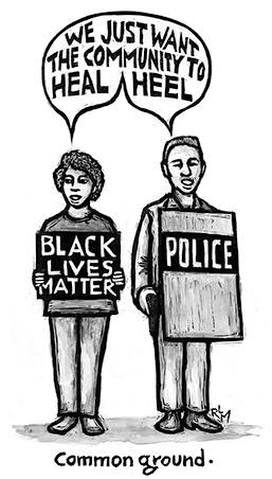 Artwork by Ricardo Levins Morales Artwork by Ricardo Levins Morales My heart hangs heavy over the events of the past few weeks in my nation, the United States. I speak, of course, to the continued murders of black men and women at the hands of law enforcement. With the advent of modern technology, nearly anyone can record video of events from their cell phone. This technology has helped pull the veil open on police brutality against citizens—especially people of color. These public videos of the murders of countless black men and women have been uncomfortable for many to see. But I think it has been the worst in White, Middle-Class America. For the most part, White Americans have been in denial of what is really happening to our sisters and brothers of color (despite their continued cries for justice). Most of us had convinced ourselves that racism was over and that all of the ideals and dreams that Rev. Dr. Martin Luther King, Jr. had worked for had been accomplished. We would tell ourselves that, "Sure, there are more blacks incarcerated per capita than whites, but that has to do with upbringing and culture. These people that are crying 'foul' are just people wanting more privileges and to free-load off of the system. After all, Bill Cosby said as much in his 'get tough talks', and he's black." This and similar critiques would be our narratives on black society, all the while ignorant of the inherent racism in our own thought processes. The murders of innocent black men and women at the hands of cops have given rise to a beautiful movement known as Black Lives Matter. These women and men have forced us to look closely at what is going on between the black community and police departments. Furthermore, it has caused us to look deeply at our understanding of race and the systems that perpetuate it. In our day and age, it is impossible to not be inundated with information on any particular subject. In no known time has so much information been so freely available and, at the same time, ignorance run so rampant. With these resources at our disposal, we residents of White America have had two options set before us: accept the reality that people of color are being targeted by police departments or double-down on our desire to remain comfortable with the status quo. 7/9/2016 Comments Dear AmeriklansBy: Nekeisha Alayna Alexis Y’all just can’t front on us niggas no more At this crucial time in our lives when everything is so desperate, when every day is a matter of survival I don’t think you can help but be involved…We will shape and mold this country or it will not be molded and shaped at all anymore. So I don’t think you have a choice. – Nina Simone 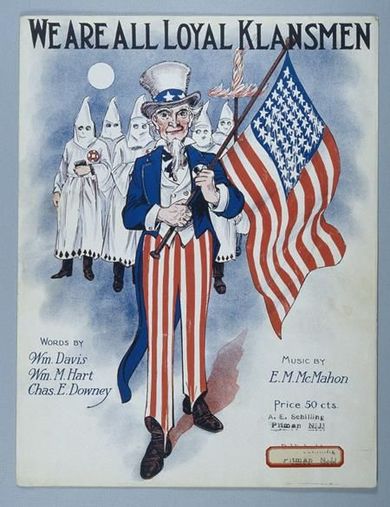 Written on July 7, 2016 Dear Americans, I am writing from a place of intense anguish and rage. I am naming this sentiment clearly, lest there be any confusion. Today is the day the police killing of Philando Castile has made the headlines, which is the day after the police killing of Alton Sterling rose to national attention. Reeling from another round of blows against we who are darker than blue, I am convinced that there needs to be new language—new terms to describe the tumultuous emotional landscape that erupts for so many Black persons when another one of our slaughtered bodies bleeds out in our streets or in our cars or on our couches or in our beds or on our playgrounds or in the halls of our apartment buildings or hangs lifelessly from a garbage bag in a jail cell. There is no single word that I know of to describe the simultaneous unsurprised surprise, the "angrief," the hopeless defiance, the wounded wrath that floods one’s entire being when unmitigated, virulent, state-sanctioned, White supremacist power and violence shows itself in another public execution. The visceral response to these acts of systemic annihilation, to this structured hatred, defies categorization. The emotion is a mystery, like trying to speak to the totality of God or the character of love in a single utterance. Yet I feel it in my body as I write to the White Majority upon whom this nation’s Klan Culture relies and through whom the plague of Black death continues. By: Dominique Chew 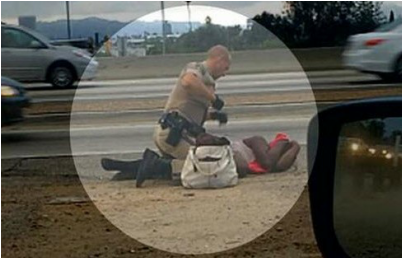 Lift ev’ry voice and sing, till earth and heaven ring, ring with the harmonies of liberty. Let our rejoicing rise high as the list’ning skies, let it resound loud as the rolling sea. We’re too intimate with brutality,” said Gina Athena Ulysse, author, feminist anthropology professor, ethnographer, member of the Haitian diaspora and performance artist, at a recent lecture I attended during the Brooklyn Book Festival. As she said these words, slow with firm intent, “We’re too intimate with brutality,” I thought of the time I was driving this summer, days after Sandra Bland’s death, and I noticed a cop car behind me and remembered that I didn’t have to be doing anything but looking like myself to get pulled over. I rehearsed what I would say to them to save my own life if they flashed their lights.
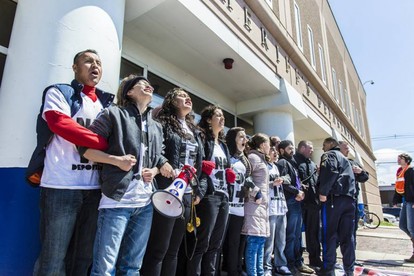 AMARYAH SHAYE JONES-ARMSTRONG: WHITENESS/CREDIT AS A DEFORMED THEOLOGICAL ANTHROPOLOGY The telos of border imperialism as described by Walia and served by policies like the Priority Enforcement program is manifestly blasphemous on any number of levels. The most obvious, and the most commonly identified by theologians is that it denies the presence of Christ in the persons of exploited, oppressed, colonized, and working people. On Good Friday 2013, in the middle of the campaign for Jose Maria Islas, over 200 of us gathered on the New Haven Green for a rally against Secure Communities under the banner Deportation Crucifies. The claim was simple: racist state violence is crucifying violence against the body of Christ, whose very flesh is the people. Christ identifies with every person in a deportation process, every person whose wages are stolen because they are undocumented, every person who is racially profiled by the police, every person under arrest or in detention, and, in so doing, reveals Barack Obama (and any other deporter-in-chief) to be a modern day Pontius Pilate. By: Jesus Radicals 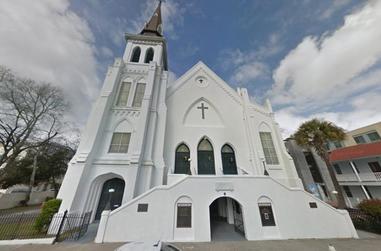 On June 17th of 2015 an evening prayer meeting at the historic Emmanuel African Methodist Episcopal Church in downtown Charleston, South Carolina was the target of white-supremacist terrorism as a 21 year old gunman, Dylann Roof, gunned down and killed 9 black men and women from ages 26 to 84 including the church's pastor, Clementa C. Pinckney. Emmanuel AME has been a rock and refuge for black folks in the south since its founding in the early 1800s and has been a major site of fomenting change for racial justice. Despite its history of persecution, having been burned down and rebuilt, its existence outlawed by Charleston law, and a host of other challenges the congregation has faced as an historic all black church in the center of racist, white-supremacist, USAmerican South, Emmanuel AME is a congregation that has shown remarkable resilience in the face of adversity and continued racially motivated terrorism and violence. The blow dealt to Emmanuel AME came as a shock to the congregants gathered together for prayer and fellowship on the evening on June 17th as they lovingly welcomed with open arms the gunman into their most sacred of spaces. These congregants' gesture of love was met with the kind of hate that most of us have never close to experienced and nine men and women had their lives stolen from them. By: Gregory Williams 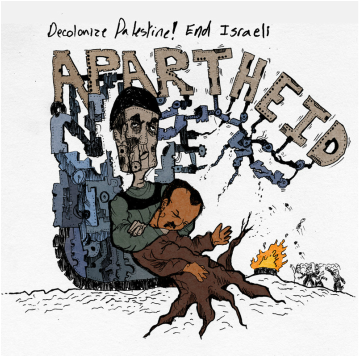 Last month, I played a support role in an anti-zionist protest of a Friends of the IDF fundraiser in Westport, Connecticut. The action unexpectedly ended in arrest, and, somewhat more predictably, was the occasion for a fierce back-and-forth in local newspapers and blogs about the IDF, the Occupation of Palestine, and the importance/inappropriateness of trying to disrupt Zionist events. My small contribution to this debate was an editorial that was circulated on several blogs and two local newspapers. In the piece, I did what I have done in several posts on Jesus Radicals and discussed Zionism as a racist, white supremacist ideology. This message, to my surprise, was almost more controversial than the initial direct action. At the time, I saw no need to defend the claim that the conversation about Zionism is, by necessity, a conversation about race. This was clearly an error on my part, given the reaction that this claim received, not only from Zionist critics, but also from skeptical supporters. It is, I have been reminded, far more common to talk about the Occupation in terms of war and peace, or human rights than in terms of race. I am not necessarily writing to change this, or to criticize other anti-zionists in any way. The last thing that our movement (or any movement) needs is a public spat over tactics or rhetoric. I wholeheartedly support anyone working for a future in which no mother is forced to give birth at a checkpoint, no child is labeled as a demographic threat from birth or forced to grow up at the point of a gun, and in which no family lives in fear of their home being destroyed by a bomb or a bulldozer. Our work is far more important than the words with which we justify it. Nonetheless, I am conscious, at this juncture, of the need to step back for a moment and offer an account of why I use the language of race to talk about Zionism. By: Gregory Williams This piece is, in many ways, an attempt to pick up a conversation that I tried to start two years ago, in 2013, when, New England, the region where I lived and worked, was responding to two violent events which received a great deal of media attention: the Newtown school shooting of December 14, 2012, and the Boston marathon bombing of April 15, 2013. It was a difficult conversation, then, and it is a difficult conversation now. To be right up front about it, dear reader, I am writing to tell you not to publicly mourn the death of a police officer. If you don’t want to read that kind of essay, now is the time to stop reading this one. 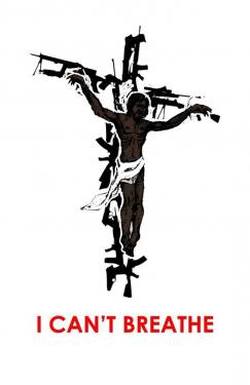 WHITE MARTYRDOM AFTER NEWTOWN AND BOSTON I wrote Newtown, Boston, and the Martyrology of Whiteness after it seemed as though New England had been in continuous mourning for several months. In December, 20 children and 6 staff at the Sandy Hook Elementary school had been killed, and faces of the victims, particularly white victims, were appearing on television screens and social media. Then, in April, three people were killed and hundreds were injured after a bomb exploded during the Boston marathon. The pictures of the victims were not as prominent in the media coverage, but what was was the non-white racial identity of the alleged killers. As someone working, at that time, with people who were undocumented, incarcerated, or homeless, most of whom were people of color, I could be (perhaps cynically) unfazed by the volume of mainstream and social media coverage: the deaths of children do not garner as much attention if those children are not white. What shocked me was the very personal nature of the treatment that the suffering that occurred at Newtown and Boston was receiving. I wrote, at the time, By: Jarrod Cochran JarrodCochran 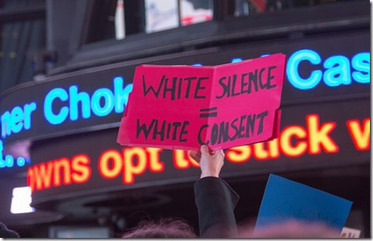 I was driving home from work when I heard about the eruption of protests in Baltimore over the death of 25 year-old Freddie Gray while in police custody. As I began to get a barrage of texts and posts on social media about the riots, I chewed it over in my mind and came up with something I felt was extremely eloquent to write about it. After I arrived home, I forgot those expressive words and stared at my blank computer screen. I began to give up and close the laptop thinking, "If you don't have something important to say, don't just run your mouth." That thought process sounds "right" on the surface. However, if we dig a little deeper, we see an ugly root. It is the Church's silence on the things that matter that has allowed so much ugliness in the forms violence, war, oppression, prejudice—all borne out of hatred and fear—to become manifest. Use your words. Use your body. Get in the way of violence and injustice. Take a stand. Just because you do not have the writing or oratory skills of Thoreau or Lucy Parsons does not mean that what you say matters less. Simply declaring that what is occurring in the world is wrong and taking a stand to make it right means more than a million good and eloquent intentions that never produced an action. When we are silent on the things that matter, we have already sided with the oppressor. It is with this understanding that I write to you now. 4/29/2015 Comments Standing Amidst the Wrath of GodBy: Nichola Torbett 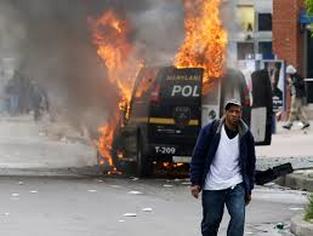 The wrath of God has been kindled and is pouring out of Baltimore in images of police cars on fire and CVS windows broken. It pours out of Baltimore as it poured out of Ferguson last summer. In the faces of chanting protestors there, I see the power of the life force refusing to be repressed any longer. The life of God is rising up and destroying the instruments of oppression like so many drowned Egyptian chariots. Praise God. Praise God, but I think if we’re honest, it makes a lot of us American Christians, and especially white American Christians like me, uncomfortable. And if ever we needed to be honest, it is now. In predominantly white progressive Christian circles, we are squeamish about this concept: the wrath of God. For instance, I have always wanted to celebrate the escape of the Hebrew slaves from Egypt while glossing over the drowning of the Egyptian soldiers in the Red Sea. After all, the Egyptian soldiers were people, too. Didn’t God care about them? |
Disclaimer
The viewpoints expressed in each reader-submitted article are the authors own, and not an “official Jesus Radicals” position. For more on our editorial policies, visit our submissions page. If you want to contact an author or you have questions, suggestions, or concerns, please contact us. CategoriesAll Accountability Advent Anarchism Animal Liberation Anthropocentrism Appropriation Biblical Exegesis Book Reviews Bread Capitalism Catholic Worker Christmas Civilization Community Complicity Confessing Cultural Hegemony Decolonization Direct Action Easter Economics Feminism Heteropatriarchy Immigration Imperialism Intersectionality Jesus Justice Lent Liberation Theology Love Mutual Liberation Nation-state Nonviolence Occupy Othering Pacifisim Peace Pedagogies Of Liberation Police Privilege Property Queer Racism Resistance Resurrection Sexuality Solidarity Speciesism Spiritual Practices Technology Temptation Veganism Violence War What We're Reading On . . . White Supremacy Zionism ContributorsNekeisha Alayna Alexis
Amaryah Armstrong Autumn Brown HH Brownsmith Jarrod Cochran Chelsea Collonge Keith Hebden Ric Hudgens Liza Minno Bloom Jocelyn Perry Eda Ruhiye Uca Joanna Shenk Nichola Torbett Mark VanSteenwyk Gregory Williams Archives
October 2017
|
Search by typing & pressing enter

 RSS Feed
RSS Feed